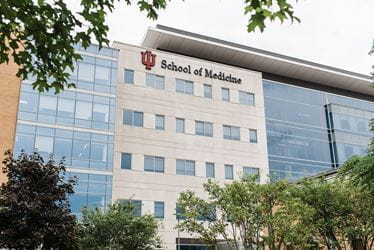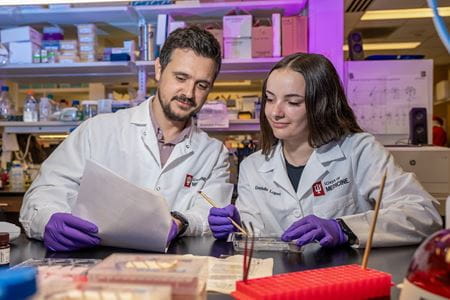Everything we eat, drink and consume is filtered through the gut microbiome. Trillions of diverse microorganisms — bacteria, fungi, parasites and viruses — live in the gut and contribute to our body’s immune system, food digestion and even the healthiness of our brains.
Growing evidence has shown that the gut can impact a person’s neurological health and potentially the progression of neurodegeneration, which can lead to Alzheimer’s disease.
A team of researchers at the Indiana University School of Medicine, led by Miguel Moutinho, PharmD, PhD, assistant research professor of anatomy, cell biology and physiology, is investigating a bacterial connection between the gut microbiome and microglia actions in Alzheimer’s disease. Moutinho received a three-year, $300,000 grant from the BrightFocus Foundation to fund the study.
Moutinho’s previous research found that niacin — a B vitamin that converts food into energy in the body — interacts with a highly-selective receptor called HCAR2 that’s present in the brain’s immune cells, called microglia. After Alzheimer’s disease animal models were treated with an FDA-approved formulation of niacin that’s traditionally used to lower cholesterol, the receptor was activated and led to fewer plaques and improved cognition.
The study identified niacin as a potential novel therapeutic agent for Alzheimer’s disease, which was translated into a clinical trial at the IU School of Medicine in 2024.
Building upon that research, Moutinho decided to investigate the connection between niacin homeostasis and the gut microbiome in Alzheimer’s disease. Studies have shown that people with Alzheimer’s disease tend to have an altered gut microbiome compared to those without the disease. This can result in an imbalance of bacteria or even chronic inflammation that influences the gut-brain connection.
 Moutinho is collaborating with Brittany Needham, PhD, an assistant professor of anatomy, cell biology, and physiology at the IU School of Medicine, and Qiyun Zhu, PhD, an assistant professor at Arizona State University. Moutinho and Needham both conduct research at the Stark Neurosciences Research Institute. Zhu, a computational biologist, analyzed human data to find specific correlations between gut dysbiosis and Alzheimer’s disease.
Moutinho is collaborating with Brittany Needham, PhD, an assistant professor of anatomy, cell biology, and physiology at the IU School of Medicine, and Qiyun Zhu, PhD, an assistant professor at Arizona State University. Moutinho and Needham both conduct research at the Stark Neurosciences Research Institute. Zhu, a computational biologist, analyzed human data to find specific correlations between gut dysbiosis and Alzheimer’s disease.
Needham studies the relationship between bacteria in the gut microbiome and altered brain activity and behavior. The health of the gut can affect a person’s neurological health, mental health and overall wellbeing, Needham said.
“Our lifestyle influences the gut microbiota,” Needham said. “If we think about eating healthy food, that's not only going to benefit the microbiota, but it also benefits us. If we aren't trying to focus on helping that microbial community in the foods or drugs we take, then it can shift toward harmful molecules being more abundant in our bodies.”
Specific bacteria in the gut produce niacin, Moutinho said, which benefits brain health and regulates blood sugar, metabolism and cholesterol levels. In Alzheimer’s disease, the pathway responsible for niacin production in the gut might get dysregulated and cause a deficiency of niacin levels.
“A lower supply of niacin to the brain can lead to reduced activation of the niacin receptor (HCAR2) in the brain-resident immune cells, which could drive the progression of Alzheimer’s disease,” Moutinho said.
The team is investigating whether niacin-producing bacteria in the gut microbiome can directly change the outcome of Alzheimer’s disease pathology. Using animal models, the researchers will modulate a specific bacterial pathway responsible for producing niacin to understand if the biosynthesis of niacin in the gut affects Alzheimer’s disease progression.
“If we discover that niacin production by the gut microbiome significantly influences Alzheimer's disease progression, we’ll have a target that is super easy to access in the gut, which we can try to modulate using different strategies,” Moutinho said. “You can do that with probiotics that are little factories that can overproduce niacin, or you can pharmacologically try to activate this pathway.”
A collaborative environment
 When Moutinho first researched this connection between the gut and Alzheimer’s disease, he needed to find an expert. Fortunately for him, Needham runs a lab focused on the gut microbiome a few floors up from where Moutinho works in the IU School of Medicine’s Neurosciences Research Building, where the Stark Neurosciences Research Institute operates.
When Moutinho first researched this connection between the gut and Alzheimer’s disease, he needed to find an expert. Fortunately for him, Needham runs a lab focused on the gut microbiome a few floors up from where Moutinho works in the IU School of Medicine’s Neurosciences Research Building, where the Stark Neurosciences Research Institute operates.
More than 110 investigators from different disciplines across IU campuses are members of the Stark Neurosciences Research Institute. Nearly 40 investigators house their labs in the Neurosciences Research Building, which is adjoined to the IU Health Neuroscience Center. This state-of-the-art neuroscience hub was designed for collaboration between doctors, researchers and trainees.
Needham joined the Department of Anatomy, Cell Biology and Physiology faculty in 2022. As a trained microbiologist, she wanted to operate her lab within the Stark Neurosciences Research Institute so she could collaborate closely with neuroscientists like Moutinho.
“Brittany [Needham] really brings something unique to this building. If I didn't know Brittany was here, I probably would have never started this project,” Moutinho said. “Stark is doing a great job in the collaborative front with recruiting researchers of differing backgrounds.”
 The Stark Neurosciences Research Institute also houses the Medical Neuroscience Graduate Program, one of the largest PhD training programs at the IU School of Medicine. More than 40 students are training to complete either their PhD or MD/PhD graduate degrees.
The Stark Neurosciences Research Institute also houses the Medical Neuroscience Graduate Program, one of the largest PhD training programs at the IU School of Medicine. More than 40 students are training to complete either their PhD or MD/PhD graduate degrees.
Daniella Lopes, a first-year PhD medical neuroscience student, will work with Moutinho and Needham in the lab. Lopes completed her undergraduate education at IU Indianapolis, and when she started her graduate studies at the IU School of Medicine, she rotated in Needham’s lab. Lopes later collaborated with Moutinho when she learned about the gut microbiome project.
"I wanted to be introduced to the gut-brain axis,” Lopes said. “I’ve never done anything with microbiology, so I thought it'd be cool to correlate the two, and then the project kind of fell into my lap. I still get to research neurodegeneration as well as gut-brain axis. I love it."
Moutinho and Needham are seeking additional grant funding to grow their research.
